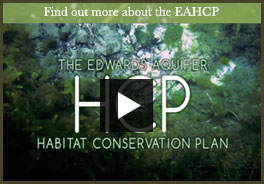Gill Parasite Control
2013 RFP and accepted Proposal for the Gill Parasite Removal
A major concern in the Comal Springs ecosystem is the continued presence of an Asian trematode, Centrocestus formosanus. This parasite was first discovered on fountain darters in the Comal River during October 1996. The parasite attached to the fish’s gill filaments causing extensive gill tissue proliferation and damage (Mitchell et al. 2000) with mortality in the wild being reported following the discovery in 1996 (Tom Brandt, personal communication).
A non-native snail, Melanoides tuberculates, that has been in Central Texas since 1964 has been confirmed as C. formosanus’ central Texas first intermediates host (Mitchell et al. 2000). Parasite monitoring via examination of presence on foundation dater gills to determine C. formosanus levels in the Comal River has been ongoing since the late 1990s by the USFWS, Texas State University, and BIO-WEST (EAA Variable Flow Study).
In 2011, USFWS and BIO-WEST conducted a pilot study for the EARIP to determine the effectiveness of M. tuberculatus removal on lowering drifting gill parasite numbers in the Comal River. (USFWS 2011) The study confirmed that removing M. tuberculatus from the Comal River will result in a decrease in C. formosanus cercariae in the water column. It also recommended adaptive management studies to better determine the magnitude and duration of the benefits from snail removal.
To minimize and mitigate for the impact of low flows, the City of New Braunfels will retain and oversee the work of a contractor to establish a gill parasite monitoring and reduction. The program may consist of non-native snail removal based on a pilot study conducted by USFWS and BIO-WEST (USFWS 2011). However, additional research on the most effective means of gill parasite removal will be conducted as part of the AMP to determine the method of gill parasite control will actually be implemented.
